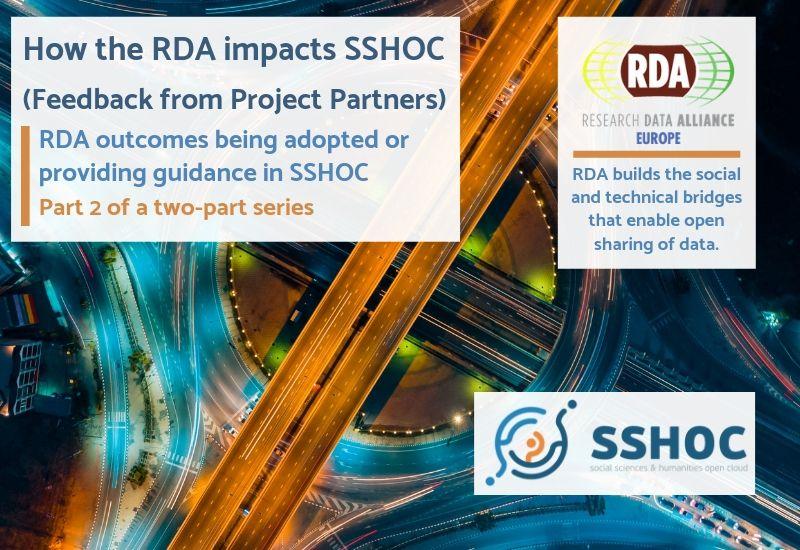
- Social Sciences & Humanities Open Cloud
How the RDA impacts SSHOC (Feedback from Project Partners)

Date:
26 July 2019
HOW THE RDA IMPACTS THE SSHOC PROJECT
Feedback from Project Partners
(Part 2 of a two-part series)
This article is the second of two in a series and explores how the partners in the SSHOC project are making use of RDA Outputs and Recommendations, and Interest and Working Groups in the course of their work. Context for this analysis is provided in Part 1: HOW THE RDA IMPACTS SOCIAL SCIENCES RESEARCH – Highlights from the Report by DANS RDA Europe 4.0 Ambassador Dr. Braukman.
The SSHOC communication team performed a lightning survey amongst partners and work group leaders to identify which RDA resources are being most widely used currently within the SSHOC project and by project partners in general. Below are the results of our investigation.
FAIR principles in SSHOC
In terms of the project goal to maximise data reuse through Open Science and FAIR principles, the RDA Recommendation FAIRsharing: standards, databases, repositories and policies is relevant to all project tasks.
RDA Outputs
The table below lists specific RDA outputs which are either being directly adopted for the completion of a task, or providing guidance and inspiration to the work in SSHOC.
RDA Output |
SSHOC task |
SSHOC and Data Communities |
|
|
The Metadata Standards Directory Working Group Recommendation
|
SSHOC will focus on three data communities for its pilots:
For the user communities in Ethnic and Migration Studies SSHOC will develop a metadata database of quantitative surveys undertaken with ethnic and migrant minority (EMM) (sub)samples across Europe and implement a pilot of the inclusion of EMM survey data in the European Question Bank (EQB). This output discusses the importance of adopting the established metadata standards for your respective research discipline. The relevant metadata standard here is DDI, working with survey metadata from the social sciences. |
|
Legal Interoperability of Research Data: Principles and Implementation Guidelines
|
These guidelines illustrate the general steps researchers need to take to mitigate the legal challenges of making data interoperable. SSHOC used these guidelines as follows:
|
Lifting Technologies and Services into the SSH Cloud |
|
|
Legal Interoperability of Research Data: Principles and Implementation Guidelines |
SSHOC works on developing, enhancing and integrating a set of tools and services for managing and processing SSH research data that are central to the user communities in SSH, based on existing tools and functionalities, and requirements for interoperability. In this context our focus is on:
|
|
Data Discovery Paradigms: User Requirements and Recommendations for Data Repositories |
With the aim of making data findable by being citable SSHOC will provide recommendations and software to:
|
|
Workflows for Research Data Publishing: Models and Key Components |
Ensuring Data and Metadata Interoperability, SSHOC will provide an inventory of data formats and metadata standards that are currently used and relevant for the research infrastructures currently managed by the SSHOC main stakeholders, recommendations of specific formats and standards for increasing interoperability, and prioritisations for providing conversion services and planning solutions. |
Build on the social and technical bridges RDA has created to enable open sharing and re-use of data!
Click here to read the full RDA for Social Sciences report
Check also SSHOC & RDA part 1: How the RDA impacts social sciences research (and what’s in it for SSHOC)
Browse the SSHOC website and join our community:
![]() LinkedIn: SSHOC
LinkedIn: SSHOC
![]() Twitter: @SSHOpenCloud
Twitter: @SSHOpenCloud
EOSC services collaborations and RDA
RDA 14th Plenary, taking place in Helsinki, Finland on 23-25 October will be preceeded by two events fully dedicated to the European Open Science Cloud and all its related initiatives.
Together with the other EOSC Cluster Projects, on 21 October SSHOC will be involved in a session on EOSC Services Collaboration and RDA. Presentations and discussions will evolve around the commonalities and potential collaborations on community research data management solutions.
Then on 22 October The International Research Data Community Contributing to EOSC will present early results for EOSC to the research data community of stakeholders, one year after the official launch of the platform.
ABOUT RDA https://www.rd-alliance.org
The Research Data Alliance (RDA) is a community-driven organisation launched in 2013 by the European Commission, the United States Government’s National Science Foundation and National institute of Standards and Technology, and the Australian Government’s Department of Innovation. The goal of the RDA is to build the social and technical infrastructure needed to enable open sharing of data across technologies, disciplines and countries. In June 2018, the RDA counted over 7000 members from 137 different countries and from various backgrounds, including data professionals, researchers, librarians and policy developers. Individual membership to the RDA is free for anyone who supports the RDA mission and its guiding principles.
Useful links:
RDA Interest Groups
RDA Working Groups
RDA Recommendations & Outputs
RDA Europe 4.0 Project
RDA on Twitter @resdatall | @RDA_Europe | @RDA_US
RDA on LinkedIn
Contact enquiries@rd-alliance.org | info@europe.rd-alliance.org
